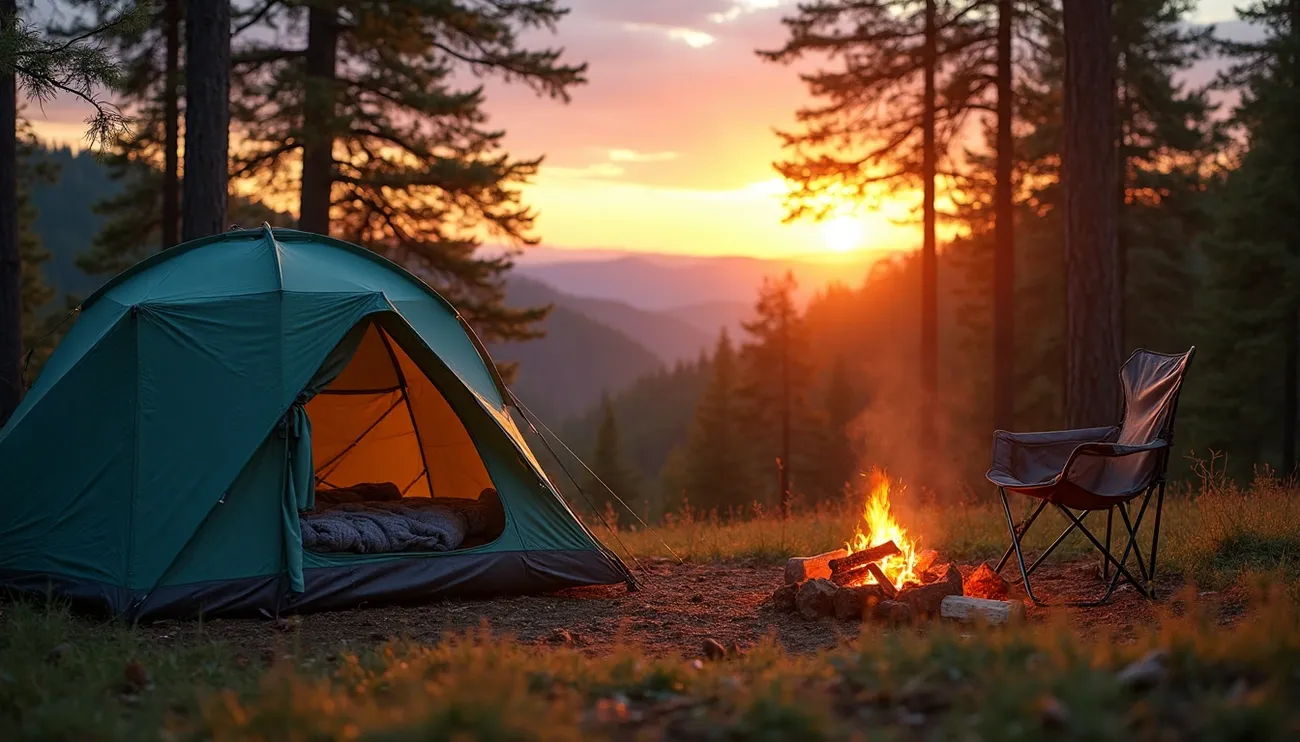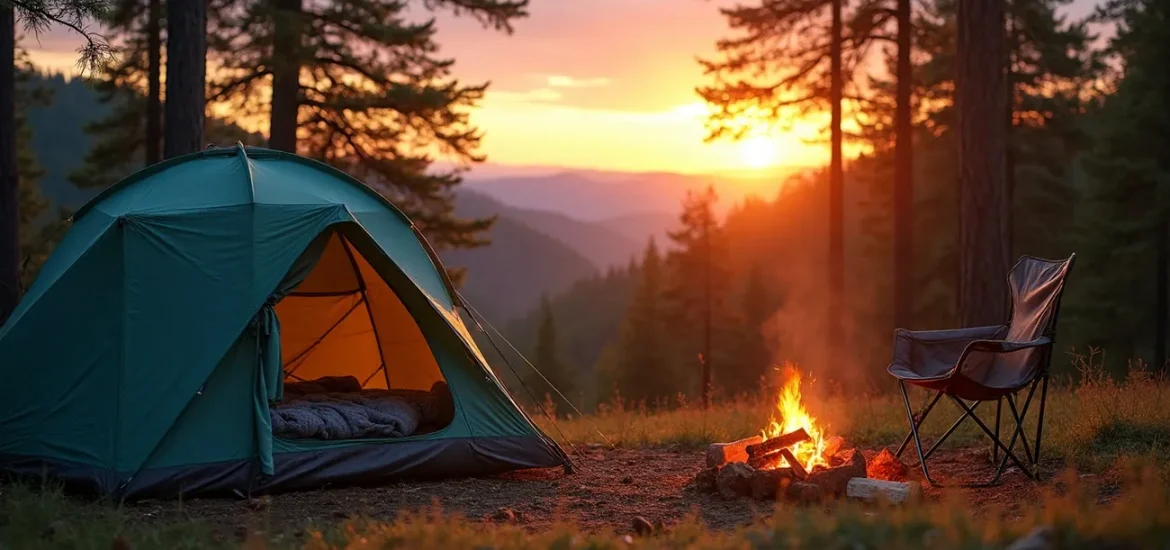
The benefits of camping extend far beyond simply enjoying the outdoors. According to research, 97% of campers say happiness is their top motivator for going camping, with 44% of campers flourishing with optimal mental health compared to just 31% of non-campers. When you begin feeling stressed or overwhelmed, you’re not alone if you find yourself retreating to nature – more than two-thirds of people report doing exactly that.
Remarkably, these camping benefits can take effect quickly. A mere 20 minutes outdoors can lead to impressive reductions in stress, while one study showed that exposure to nature can regulate your sympathetic nervous system in as little as five minutes. Additionally, researchers have found that just spending 3 days outdoors has a tremendous effect on our brains, increasing sensory perception, empathy, productive day-dreaming, and creative problem solving.
Throughout this article, you’ll discover how camping helps reduce stress and anxiety, enhances cognitive and emotional functions, improves sleep, boosts physical health, and provides unique mental health benefits for children. With over 93.8 million North American households identifying as campers, perhaps it’s time you considered whether this natural remedy could be your best mental health medicine.
How camping helps reduce stress and anxiety
Stepping into the wilderness does more than just surround you with scenic views. The benefits of camping for mental health are backed by scientific research showing profound effects on your brain and body’s stress response systems.
Nature’s effect on the nervous system
Nature helps activate your parasympathetic nervous system—the “rest and digest” mode that counteracts stress responses. This essential shift allows your body to recover from the constant alertness that modern life demands. As a result, spending time in natural settings leads to improved mood, making you feel happier and significantly less irritable.
Notably, the calming sounds of flowing water, rustling leaves, and birdsong serve as natural sedatives for an overstimulated mind. For children, these benefits are particularly valuable—exposure to nature has been linked to reduced symptoms of ADHD and a lower risk of developing mental health difficulties as adults.
How quickly stress levels drop outdoors
The stress-reducing effects of nature happen faster than you might expect:
- In just 5 minutes, nature exposure can regulate your sympathetic nervous system
- After 20-30 minutes outdoors, cortisol levels (your primary stress hormone) drop at their greatest rate
- Spending two hours per week in nature has been linked to better overall health and wellbeing
Research shows that these benefits occur regardless of the time of day or specific setting. Furthermore, the nature “dose” needed isn’t large—even short nature breaks during a busy workday can provide meaningful mental health benefits.
Why unplugging matters
One of the most powerful camping benefits comes from disconnecting from technology. In essence, camping forces a digital detox that many mental health professionals now recommend.
Our brains weren’t designed to process nonstop digital stimulation. Without the constant pings of notifications and emails, your thoughts begin to slow, your senses reawaken, and you become more present. This technological break helps reduce burnout symptoms and allows your mind to truly reset.
For this reason, camping creates an environment where mindfulness happens naturally. Without screens dominating your attention, you’re free to engage fully with your surroundings and companions—fostering deeper connections and enhancing creative thinking.
Cognitive and emotional benefits of camping
Beyond stress reduction, camping offers profound cognitive enhancements that stay with you long after you’ve packed up your tent. Research indicates these mental benefits begin remarkably fast and continue to grow with regular nature exposure.
Improved focus and memory
Your brain experiences significant positive changes when exposed to natural environments. Studies show that spending time in nature can improve cognitive function – specifically attention, memory, and concentration. Indeed, the hippocampus—responsible for memory and learning—thrives in oxygen-rich environments you experience while camping.
Research reveals that people who interact with natural environments show a 50% improvement in performance on creative problem-solving tasks. Moreover, following interactions with nature, individuals perform better on tasks requiring directed attention control, such as working memory tasks.
Even brief nature exposures help—one study demonstrated improved performance and increased amplitude of the P300 (a neural response associated with attention and working memory) after just a 15-minute outdoor walk.
Boost in creativity and problem-solving
The natural environment supercharges your creative abilities. Studies have found that exposure to natural environments enhances creative thinking by up to 60%. Consequently, this improved creativity extends beyond your camping trip, with many people reporting better workplace performance for weeks afterward.
Without GPS, streaming content, or digital assistants, camping encourages thinking on your feet. Simple tasks like building a fire or setting up a tent stimulate creativity and practical skills. Likewise, the absence of technological distractions creates mental space for new ideas to flourish.
Better emotional regulation
Approximately 85% of campers report experiencing deeper states of mindfulness during outdoor stays. This heightened mindfulness reduces anxiety levels by up to 30% while promoting better emotional regulation.
For children specifically, outdoor play from noon to 6 PM relates to lower emotional dysregulation, with working memory fully mediating this effect. Subsequently, camping provides an environment where children learn to communicate, cooperate, and resolve conflicts—teaching them to manage emotions in social contexts.
The combination of sunlight, physical activity, and natural settings triggers serotonin release (the ‘happiness hormone’), leading to improved cognitive function and emotional stability. In essence, camping creates a natural therapy that resets mental processes and restores emotional balance.
Camping’s impact on sleep and physical health
Sleep quality drastically improves when you trade your bedroom ceiling for a canopy of stars. Under the night sky, your body naturally aligns with the earth’s day-night cycle, providing one of the most overlooked benefits of camping.
Resetting your circadian rhythm
Your internal clock responds powerfully to natural light patterns. Without artificial lighting, your brain releases melatonin earlier in the evening, helping you fall asleep faster and stay asleep longer. This natural reset can help correct sleep patterns disrupted by modern living, especially for those struggling with insomnia.
How nature improves sleep quality
The absence of urban noise pollution creates ideal sleeping conditions. Rather than car horns and neighbors, the gentle sounds of rustling leaves and distant streams act as natural white noise. Furthermore, the cooler temperatures typically experienced while camping promote deeper sleep stages throughout the night.
Physical activity in natural settings
Hiking, swimming, and setting up camp naturally incorporate full-body movements that exhaust your muscles in healthy ways. Unlike repetitive gym routines, these varied activities engage different muscle groups simultaneously.
Children especially thrive in these natural settings. Not only do they sleep better after a day of outdoor play, but they also develop stronger coordination and spatial awareness skills. Instead of screen-induced hyperarousal, nature provides the perfect balance of stimulation and calm that growing bodies need for optimal development.
Why camping is great for kids’ mental health
For younger campers, the wilderness offers a natural playground that nurtures mental wellbeing in remarkable ways. The benefits of camping extend far beyond simple enjoyment when it comes to children’s psychological development.
Building resilience and confidence
Children develop crucial life skills through camping challenges. Despite facing unfamiliar situations, they learn to adapt and overcome obstacles—from setting up tents to navigating trails. Through these experiences, kids build self-reliance and emotional resilience that transfers to everyday life challenges.
Encouraging curiosity and learning
Nature serves as the ultimate classroom. Children who camp regularly demonstrate heightened observational skills and scientific thinking. Above all, they develop genuine environmental appreciation. In fact, camping experiences often spark lifelong interests in ecology, biology, and outdoor activities.
Reducing screen time and overstimulation
In contrast to their technology-saturated daily lives, camping creates a natural digital detox. This break is essential since excessive screen time correlates with anxiety and depression in children. The natural environment provides the ideal sensory balance—stimulating enough to engage without overwhelming young nervous systems.
Creating lasting family memories
Perhaps the most valuable camping benefit comes from shared experiences. Quality time spent around campfires creates stronger family bonds and communication pathways. These positive memories become emotional anchors that children can draw upon during difficult times, providing a sense of security and belonging throughout their lives.
Conclusion
Nature truly stands as one of our most powerful yet underutilized mental health resources. Throughout this exploration of camping benefits, we’ve seen how even brief outdoor experiences can significantly reduce stress, improve cognitive function, and enhance emotional regulation. The evidence speaks clearly—camping offers a comprehensive mental health boost that many expensive therapies struggle to match.
After all, few other activities simultaneously reset your circadian rhythm, disconnect you from digital overload, and stimulate your brain in ways that improve creativity and problem-solving. The physical benefits work hand-in-hand with mental improvements, creating a positive cycle that continues well beyond your return home.
Certainly, these advantages extend to every family member. Children especially thrive in natural settings, developing resilience, confidence, and meaningful connections that shape their emotional health for years to come. The memories created around campfires often become touchstones of security during challenging times.
Whether you choose a weekend getaway or a longer wilderness adventure, the mental health benefits begin almost immediately. Your brain and body respond to nature’s rhythms surprisingly quickly, with stress hormones dropping and creative thinking expanding within hours of arrival.
The next time life feels overwhelming, consider packing a tent instead of scrolling through social media. The forest floor might just offer better therapy than your living room couch. With nearly 94 million North American households already experiencing these benefits, camping has clearly evolved from simple recreation to essential mental health medicine. Your mind and body will thank you for the prescription.

